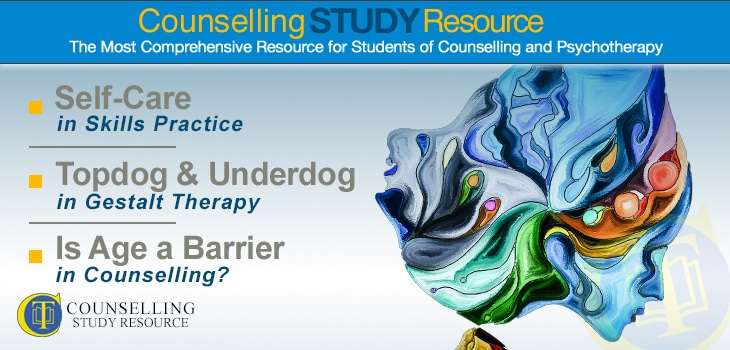052 – Self-Care in Skills Practice – Topdog and Underdog in Gestalt Therapy – Is Age a Barrier in Counselling?
In episode 52 of the Counselling Tutor Podcast, Ken and Rory discuss how to look after yourself in skills practice. ‘Theory with Rory’ looks at the concepts of topdog and underdog in gestalt therapy. Last, the presenters debate whether (either younger or older) age is a barrier for counsellors.
Self-Care in Skills Practice (starts at 2.02 mins)
Is it ethical to ask students to divulge their own personal material in skills practice when counselling is a contracted activity? And is it possible to become a counsellor without being counselled by your fellow students? Ken and Rory offer the following insights:
- Bringing real material to skills practice is much better (and less complicated) than trying to fabricate a story, but this material does not have to be deep. For example, you could talk about an everyday situation where you had recently felt irritation or another emotion.
- It is important that the tutor provides leadership to the group, in order to help keep everyone safe. Making a consensual group contract at the very beginning of the course is vital in this respect.
- The tutor should ensure that students know they are free to share as much or as little as they feel comfortable with.
- It does take time for mutual trust to develop; this often happens naturally as you get better acquainted with your peers, especially on longer courses and those that involve personal-development groups.
- Remember that when a tutor or peer is observing skills practice, they are focusing on the counsellor’s skills rather than on the client’s material.
Topdog and Underdog in Gestalt Therapy (starts at 12.30 mins)
Fritz Perls, one of the founders of gestalt therapy, believed that the topdog–underdog split is common in the human personality. You can see Perls counselling Gloria on the video below (though modern gestalt practitioners would use a more relational approach).
The topdog is your conscience (or superego, in Sigmund Freud’s terms). Rory gives the examples of speeding on the road or having an extra glass of wine: your topdog tells you off! The idea of the topdog in gestalt therapy links to that of introjected values in the person-centred approach.
Meanwhile, the underdog is the part of the psyche that rebels against the topdog, saying: ‘I can’t!’, ‘If only …’ and ‘Of course, but …’ The topdog can be compared to a parent figure that guides your moral compass, while the underdog is a child, looking for ways of avoiding the difficulties of life. Typically, the underdog wins the battle, often triggering anxiety or depression.
The idea of topdog and underdog underlie the basis of gestalt therapy: to reflect back and challenge clients’ incongruent parts in order to help them become whole (hence the term ‘gestalt’, meaning ‘whole’ or ‘circle’ in German). Rory goes on to describe the empty-chair technique, used in gestalt to help clients break out of being trapped.
You can download a free handout on the topdog and underdog concepts here or through the Handouts Vault.
Free Handout Download
Topdog-Underdog in Gestalt Therapy
Is Age a Barrier in Counselling? (starts at 16.34 mins)
Can you be too young or too old to counsel a client effectively? Ken and Rory think not.
Although clients are of course free to judge you as such – and may start with an initial judgement of your age relative to theirs – any apparent difference is likely to dissolve as the therapeutic relationship is built and as relational depth is achieved.
If it is you yourself that feels you are too young/old to counsel a client, explore this with your peers, tutor and/or personal counsellor. Feeling this way could stop you being fully present with the client. Getting to understand your feelings could be a rich source of personal development, leading to enhanced self-awareness and greater effectiveness as a counsellor.
Links and Resources
Counselling Tutor Handouts Vault
